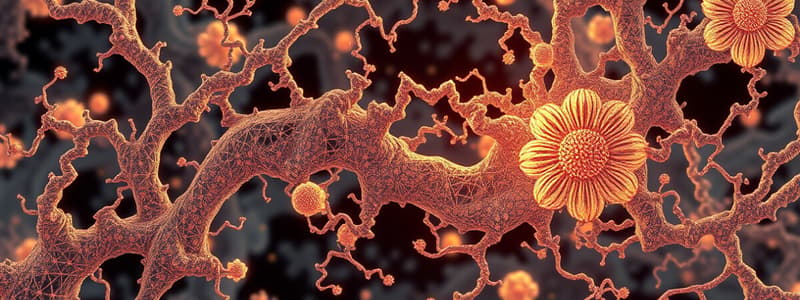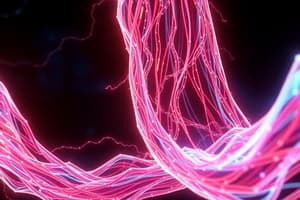Podcast
Questions and Answers
What initiates the activation of MLCK in smooth muscle contraction?
What initiates the activation of MLCK in smooth muscle contraction?
- Dephosphorylation of myosin heads
- Hyperpolarization of the membrane
- Increased intracellular calcium binding with Calmodulin (correct)
- Opening of potassium channels
What happens to myosin heads when MLCP is activated?
What happens to myosin heads when MLCP is activated?
- They interact with Calmodulin
- They are inactivated by dephosphorylation (correct)
- They bind with actin to promote contraction
- They become phosphorylated
Which event directly follows the opening of Na+ channels if the threshold is reached?
Which event directly follows the opening of Na+ channels if the threshold is reached?
- Membrane begins to repolarize
- Membrane depolarizes rapidly (correct)
- Myosin heads become activated
- K+ channels open and K+ starts to leave
In the sequence of smooth muscle contraction, which statement accurately describes the signaling pathway?
In the sequence of smooth muscle contraction, which statement accurately describes the signaling pathway?
What is the result of potassium channels remaining open during the action potential phase?
What is the result of potassium channels remaining open during the action potential phase?
What is the initial biochemical action taken by the head of myosin during the formation of the actin-myosin complex?
What is the initial biochemical action taken by the head of myosin during the formation of the actin-myosin complex?
Which scenario describes what happens when a small load is placed on the muscle during contraction?
Which scenario describes what happens when a small load is placed on the muscle during contraction?
What triggers the detachment of the myosin head from the actin filament?
What triggers the detachment of the myosin head from the actin filament?
What effect does a large load have on the interaction between actin and myosin?
What effect does a large load have on the interaction between actin and myosin?
What is the role of ATP in the reactivation of the myosin head?
What is the role of ATP in the reactivation of the myosin head?
What happens to the membrane potential immediately after K+ channels open at the peak of action potential?
What happens to the membrane potential immediately after K+ channels open at the peak of action potential?
What is the role of the Na+/K+ transporter after the action potential occurs?
What is the role of the Na+/K+ transporter after the action potential occurs?
Which channel type is primarily responsible for the regeneration of the action potential along the axon?
Which channel type is primarily responsible for the regeneration of the action potential along the axon?
What state does the membrane enter when it becomes hyperpolarized after an action potential?
What state does the membrane enter when it becomes hyperpolarized after an action potential?
Which of the following molecules activates myosin heads in smooth muscle contraction?
Which of the following molecules activates myosin heads in smooth muscle contraction?
What results from the opening of K+ channels during the action potential?
What results from the opening of K+ channels during the action potential?
What occurs if the threshold of excitation is not reached?
What occurs if the threshold of excitation is not reached?
Which component in smooth muscle contraction inhibits the myosin head activity?
Which component in smooth muscle contraction inhibits the myosin head activity?
What initiates the propagation of an action potential along an excitable membrane?
What initiates the propagation of an action potential along an excitable membrane?
During the refractory period, what is the primary ion that exits the cell?
During the refractory period, what is the primary ion that exits the cell?
What is the normal resting membrane potential (RMP) of a nerve cell?
What is the normal resting membrane potential (RMP) of a nerve cell?
What happens to sodium ion channels during the repolarization phase of an action potential?
What happens to sodium ion channels during the repolarization phase of an action potential?
What leads to the depolarization of the axon membrane during an action potential?
What leads to the depolarization of the axon membrane during an action potential?
Which of the following best describes the function of action potentials?
Which of the following best describes the function of action potentials?
What occurs immediately after a stimulus causes the membrane to depolarize?
What occurs immediately after a stimulus causes the membrane to depolarize?
What ensures that a cell cannot fire again during the refractory period?
What ensures that a cell cannot fire again during the refractory period?
What initiates the depolarization process in a neuron?
What initiates the depolarization process in a neuron?
Which condition must be met for an action potential to propagate along the membrane?
Which condition must be met for an action potential to propagate along the membrane?
During which stage of the action potential do K+ channels open and Na+ channels close?
During which stage of the action potential do K+ channels open and Na+ channels close?
What primarily influences the resting potential of a neuron?
What primarily influences the resting potential of a neuron?
What happens immediately after the peak of the action potential?
What happens immediately after the peak of the action potential?
In what scenario might the depolarization process not travel down a neuron's membrane?
In what scenario might the depolarization process not travel down a neuron's membrane?
What is the refractory period in a neuron?
What is the refractory period in a neuron?
What role do leak channels play in maintaining resting potential?
What role do leak channels play in maintaining resting potential?
Flashcards are hidden until you start studying
Study Notes
Formation of Actin-Myosin Complex
- Myosin head binds with ATP, initiating the contraction cycle.
- ATPase activity hydrolyzes ATP into ADP and inorganic phosphate (Pi), releasing energy.
- The energized myosin head moves perpendicularly towards actin, leading to attachment.
Effects of Power Stroke
- With a small load, actin slides over myosin, resulting in muscle shortening.
- With a large load, myosin head flexes and stretches the elastic neck without actin sliding.
Detachment of Myosin Head
- Release of ADP and Pi allows new ATP to bind to the myosin head.
- The new ATP has a low affinity for actin, causing the myosin head to detach from actin.
Reactivation of Myosin Head
- The bound ATP splits into ADP and Pi again, energizing the myosin head.
- The reactivated head moves towards actin filaments, ready for another cycle of contraction.
Skeletal and Smooth Muscle Comparison
- Skeletal muscle has a resting membrane potential of approximately -70mV, influenced by ion concentration differences.
- Action potentials involve rapid depolarization followed by repolarization.
- Depolarization reaches a threshold, opening Na+ channels and allowing Na+ influx.
Action Potential Mechanism
- Potassium ion conductance is significantly higher than sodium during the resting state.
- A stimulus leads to depolarization of target cells toward the threshold potential.
- If the threshold is reached, Na+ channels open and rapid depolarization occurs.
- K+ channels open at peak action potential, leading to hyperpolarization.
- The cell resets its membrane potential as K+ channels close and Na+/K+ transporter restores resting potential.
Key Players in Smooth Muscle Contraction
- Calmodulin binds with intracellular calcium (Ca²+) to activate myosin light chain kinase (MLCK).
- MLCK phosphorylates and activates myosin heads, promoting contraction.
- Myosin light chain phosphatase (MLCP) dephosphorylates and inactivates myosin heads, leading to relaxation.
Sequence of Events in Action Potential
- A sensory stimulus depolarizes the membrane toward the threshold.
- After repolarization, hyperpolarization occurs, placing the membrane in a refractory state.
- Restoration to resting potential involves closure of K+ channels and transporters.
Studying That Suits You
Use AI to generate personalized quizzes and flashcards to suit your learning preferences.



